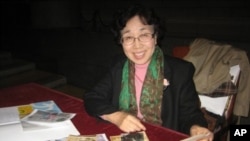North Korea’s announcement that it will soon launch a long-range rocket has raised tensions and affected reconciliation efforts on the divided peninsula. That includes new rounds of inter-Korean family reunions with South Korea. Hundreds of thousands of relatives have remained separated since the Korean War began, in the early 1950s.
Kim's story
Kim Young-ja was seven-years-old on the eve of the Korean War, in the spring of 1950. She lived with her grandparents in a North Korean town, just across the border from South Korea.
Kim recalls the day she last saw her mother.
Kim says her mother wanted to take her back home with her to another town. But her grandparents refused, because Kim’s mother had remarried after her father’s death. Kim says all she remembers is seeing her mother cry.
During the war, Kim and her grandparents were separated from her mother. When the fighting ended in 1953, Kim’s town had become a part of South Korea and her mother was still somewhere in the North.
Hope
But Kim never lost hope. In the 1990's she reached out to distant relatives in China. She learned that her mother had passed away, but that she had a half brother who lived in Pyongyang. Because there is no mail or telephone service between the two Koreas, the two half siblings exchanged letters by way of a Chinese middleman who traveled to North Korea.
Some North Koreans are given official permission to travel to China to visit family members. Kim says her brother was too sick to do that. But in the summer of 2011, his wife, Kim’s sister-in-law, obtained a travel permit.
Kim flew to the Chinese border city, Dandong, to meet with this relative she never knew she had. Kim says she hoped she could get answers about her mother’s life since the war.
First meeting
Kim says she had a lot of mixed emotions when she met her sister-in-law. She asked a lot of questions about her mother, but the woman had only met her briefly before she died.
Even though Kim did not get all the answers she hoped for from her sister-in-law, she was still grateful for the opportunity to meet her. She knows it is a chance that most Koreans will never have.
Official inter-Korean family reunions have been on hold since 2010, with no sign of another round on the way. So, left with no other options, a handful of South Koreans, like Kim Young-ja, have decided to arrange them on their own.
Running out of time
According to the South Korean Red Cross, the organization that stages the official reunions, 800,000 Koreans in the south are hoping to reunite with relatives in the North.
But the Red Cross’s Kim Seong-gun says time is running out for most of these people, who are now in their 70s and 80s.
He says, in one year, about 3,600 people die while waiting to be reunited. That comes out to about ten people a day. Kim says he does not know if one country is more to blame for the halt in official reunions. But he says South Korea has repeatedly asked the North to hold more rounds and those requests keep getting rejected.
Red Cross figures indicate that privately arranged family reunions numbered a few hundred per year, a decade ago. But that number has now dwindled, because of the relatives' old age.
Postal connection
Even though most of these people are unable to meet their relatives in person, some are doing the next best thing.
Shin Gu-seo heads an association for divided families that arranges postal exchanges between South and North Korea, through China and Japan.
The 79-year-old says, in the past two decades, he has helped some 400 South Koreans make contact with relatives in the North. And, that includes himself.
Shin says communicating by mail is not the most satisfying way of contacting his brothers and sisters in the North, but considering the risks involved in meeting them in person, this is the best he can get. He says he also sends his family things like warm clothes.
Shin says the letters he sends and receives are most likely screened by the North Korean government. But that does not bother him. He says it is better than no contact at all.
For Kim Young-ja, the woman who met her North Korean sister in law last year, a face-to-face meeting was more than she ever expected.
Kim says, even though she was not able to meet her mother or brother, she still feels lucky. She says she felt a connection with her sister-in-law and that it was a great experience.
But, given the current state of inter-Korean relations, Kim says she doubts that she will have any further contact with her North Korean family again.







